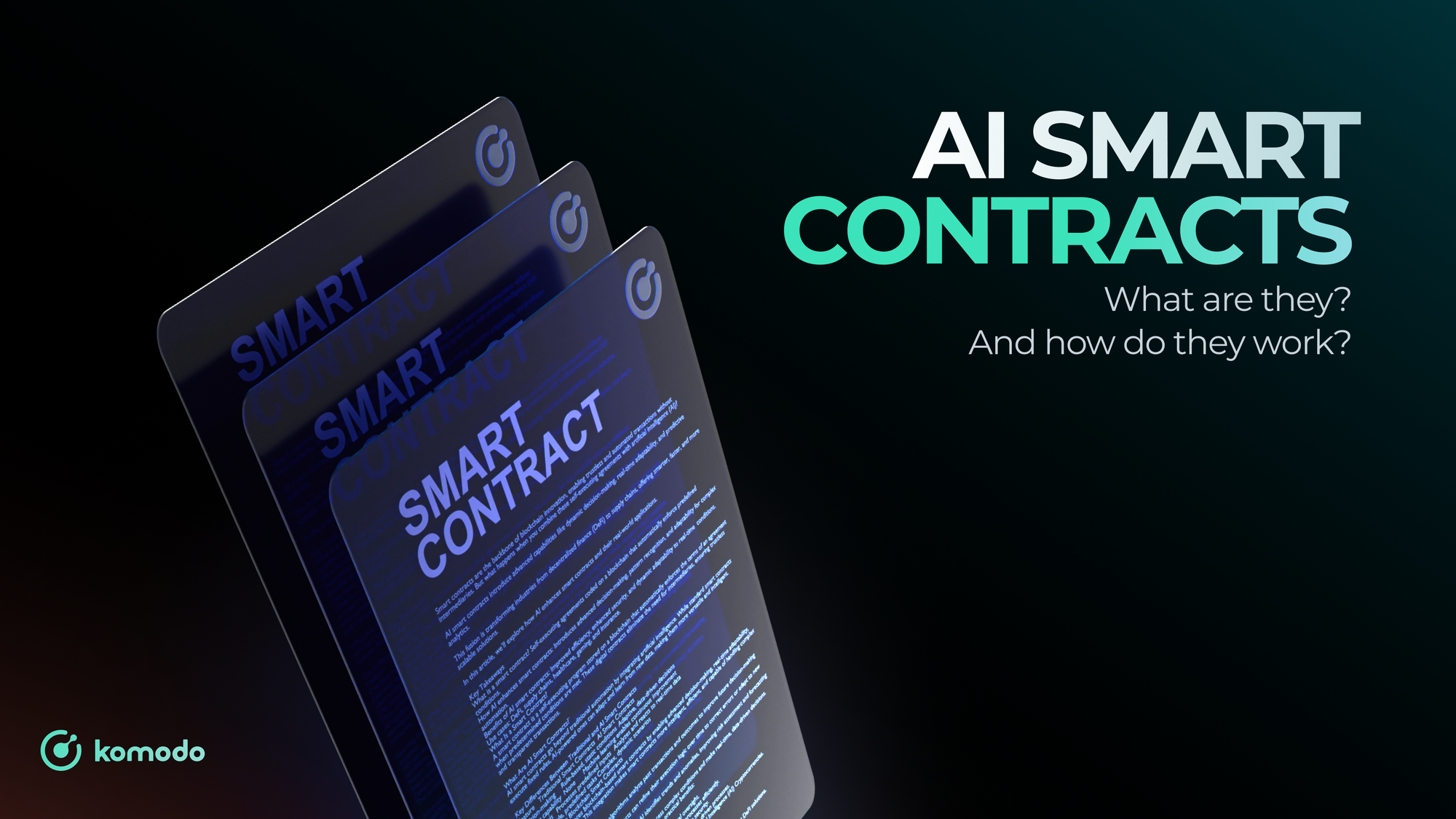Smart contracts are the backbone of blockchain innovation, enabling trustless and automated transactions without intermediaries. But what happens when you combine these self-executing agreements with artificial intelligence (AI)?
AI smart contracts introduce advanced capabilities like dynamic decision-making, real-time adaptability, and predictive analytics.
This fusion is transforming industries from decentralized finance (DeFi) to supply chains, offering smarter, faster, and more scalable solutions.
In this article, we'll explore how AI enhances smart contracts and their real-world applications.
Key Takeaways
- What is a smart contract? Self-executing agreements coded on a blockchain that automatically enforce predefined conditions.
- How AI enhances smart contracts: Introduces advanced decision-making, pattern recognition, and adaptability for complex automation.
- Benefits of AI smart contracts: Improved efficiency, enhanced security, and dynamic adaptability to real-time conditions.
- Use cases: DeFi, supply chains, healthcare, gaming, and insurance.
What Is a Smart Contract?
A smart contract is a self-executing program stored on a blockchain that automatically enforces the terms of an agreement when predetermined conditions are met. These digital contracts eliminate the need for intermediaries, ensuring trustless and transparent transactions.
What Are AI Smart Contracts?
AI smart contracts go beyond traditional automation by integrating artificial intelligence. While standard smart contracts execute fixed rules, AI-powered ones can adapt and learn from new data, making them more versatile and intelligent.
Key Differences Between Traditional and AI Smart Contracts
| Feature | Traditional Smart Contracts | AI Smart Contracts |
|---|---|---|
| Decision-making | Rule-based, static conditions | Adaptive, data-driven decisions |
| Learning capability | None | Machine learning enables continuous improvement |
| Data analysis | Processes predefined inputs | Analyzes and reacts to real-time data |
| Use cases | Simple, predefined tasks | Complex, dynamic scenarios |
How AI Enhances Blockchain Smart Contracts
AI significantly enhances blockchain-based smart contracts by enabling advanced decision-making, real-time adaptability, and improved security. This integration makes smart contracts more intelligent, efficient, and capable of handling complex scenarios.
- Learning from historical data: AI algorithms analyze past transactions and outcomes to improve future decision-making accuracy.
- Self-correction and adaptability: Contracts can refine their execution logic over time to correct errors or adapt to new conditions.
- Pattern recognition and predictive behavior: AI identifies trends and anomalies, improving risk assessment and forecasting future outcomes.
- Decision-making: AI enables smart contracts to process complex conditions and make real-time, data-driven decisions.
The combination of AI and smart contracts also brings practical benefits:
- Automation: Streamlines complex workflows, reducing manual oversight.
- Scalability: Handles large datasets and intricate decision-making processes efficiently.
- Security: AI enhances monitoring for anomalies, improving contract security.
- Efficiency: Executes faster and more accurately than traditional human-driven processes.
Discover how AI is shaping blockchain in our guide to the Top 5 Artificial Intelligence (AI) Cryptocurrencies.
Use Cases of AI Smart Contracts
AI-powered smart contracts are driving innovation across multiple industries:
- DeFi: Enables real-time loan approvals using AI-driven risk assessment. Learn more about DeFi solutions.
- Supply Chain: Automates logistics processes and monitors product authenticity through AI insights via blockchain supply chain solutions.
- Healthcare: Facilitates secure, privacy-preserving patient data access for clinical research.
- Gaming: Powers dynamic in-game economies that adapt based on player behavior.
- Insurance: Enhances smart claims processing through AI-based risk analysis.
Challenges and Limitations of AI Smart Contracts
- Data quality dependence: AI effectiveness relies on accurate and diverse data inputs.
- Complexity: More sophisticated logic increases the difficulty of development and auditing.
- Ethical considerations: AI decision-making raises concerns about transparency and bias.
The Future of AI and Smart Contracts
As Web3 evolves, AI and smart contracts will play a crucial role in driving innovation and improving interoperability:
- AI in Web3: Supports decentralized governance and autonomous financial systems.
- Cross-chain compatibility: Enhances interoperability between different blockchain networks.
- DAO governance: Facilitates automated and fair decision-making processes.
Learn more about the future of decentralized finance with our guide on What Is a Web3 Wallet?
Conclusion
AI smart contracts represent a significant leap forward in blockchain technology, enhancing automation, adaptability, and decision-making capabilities. As the technology evolves, their potential to transform industries will continue to grow. Want to build your own DeFi applications?
Discover how Komodo Platform empowers secure, customizable blockchain solutions for your next project.
FAQ
How do AI smart contracts differ from traditional smart contracts?
AI smart contracts utilize machine learning for adaptive decision-making, while traditional contracts follow static, predefined rules.
What are the benefits of using AI and smart contracts?
They offer improved automation, real-time adaptability, enhanced security, and increased efficiency.
What are the challenges of using AI in blockchain smart contracts?
Challenges include data quality reliance, development complexity, and ethical concerns regarding AI decision-making.
Can AI smart contracts operate across multiple blockchains
AI smart contracts can potentially operate across multiple blockchains if integrated with cross-chain solutions, enabling broader interoperability and data sharing.
What industries benefit most from AI-powered smart contracts?
Industries like DeFi, supply chain, healthcare, gaming, and insurance benefit from AI-powered smart contracts due to improved automation, accuracy, and decision-making.
